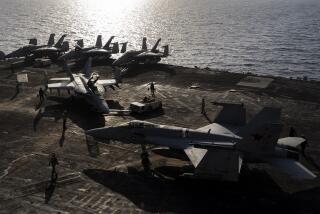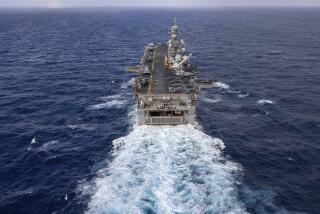Not a Clean Sweep
- Share via
The mine explosion that blew a hole in the underside of the reflagged oil tanker Bridgeton last week also blew away any remaining illusion that the Reagan Administration appreciated what it was getting into when it offered U.S. naval protection for Kuwaiti shipping in the Persian Gulf. Not only has the Administration presented a fait accompli to Congress by committing the Navy to an open-ended venture in distant hostile waters, but it is now seen to have acted with only minimal regard for the most obvious of military dangers. Did it really take an explosion under the Bridgeton to alert Washington to the threat of mines in the gulf? Inexplicably, that seems to be the case.
Inexplicably, because it was certainly no secret that easily sown but not so easily detected mines were something that had to be worried about. In a well-publicized incident months ago, a Soviet tanker leased to Kuwait was struck and severely damaged by an Iranian mine. Other merchant ships in various parts of the gulf had earlier sustained damage from mines. What happened to the Bridgeton then, and what might just as easily have happened to one of its Navy escorts, could not have come as a surprise. The excuse that U.S. officials gave for failing to anticipate what occurred--that they didn’t realize that Iran had been mining the particular part of the gulf where the Bridgeton was hit--may be true, but it also seems remarkably disingenuous. Military planners are trained to expect the unexpected.
The simple truth may be that the United States didn’t conduct proper minesweeping operations before it started convoying Kuwaiti ships because it didn’t have the means to conduct them. Hundreds of billions of dollars spent in the last six years to build up the Navy have left it still with only three aged minesweepers, all based thousands of miles and weeks away from the gulf. The Navy does have modern mine-clearing helicopters. What it doesn’t have and hasn’t been able to get is permission from Kuwait or Saudi Arabia to let the choppers operate from their territory. In consequence, the eight mine-clearing helicopters that have now been urgently dispatched to the area will be fored to operate from the far more limited space of the assault ship Guadalcanal.
That is hardly the preferable option. Not only would it be easier and more effective to service, maintain and fly the helicopters from a land base, but the need for the Guadalcanal now to move from its current station in the Indian Ocean into the gulf inevitably increases the exposure of U.S. forces to possible hostile action.
The errors of the Administration’s Persian Gulf policy thus accumulate. It committed the United States to intervention without seeking the advice or consent of Congress. It agreed to help Kuwait without getting reciprocal agreement for help from Kuwait. Despite months of preparation, it failed to plan for appropriate defensive measures before sending ships into the battle zone. Now it is forced to conduct a costly airlift of mine-clearing helicopters and their support forces to the war area. The commitment grows. So does the risk to American ships and crews.
More to Read
Sign up for Essential California
The most important California stories and recommendations in your inbox every morning.
You may occasionally receive promotional content from the Los Angeles Times.













